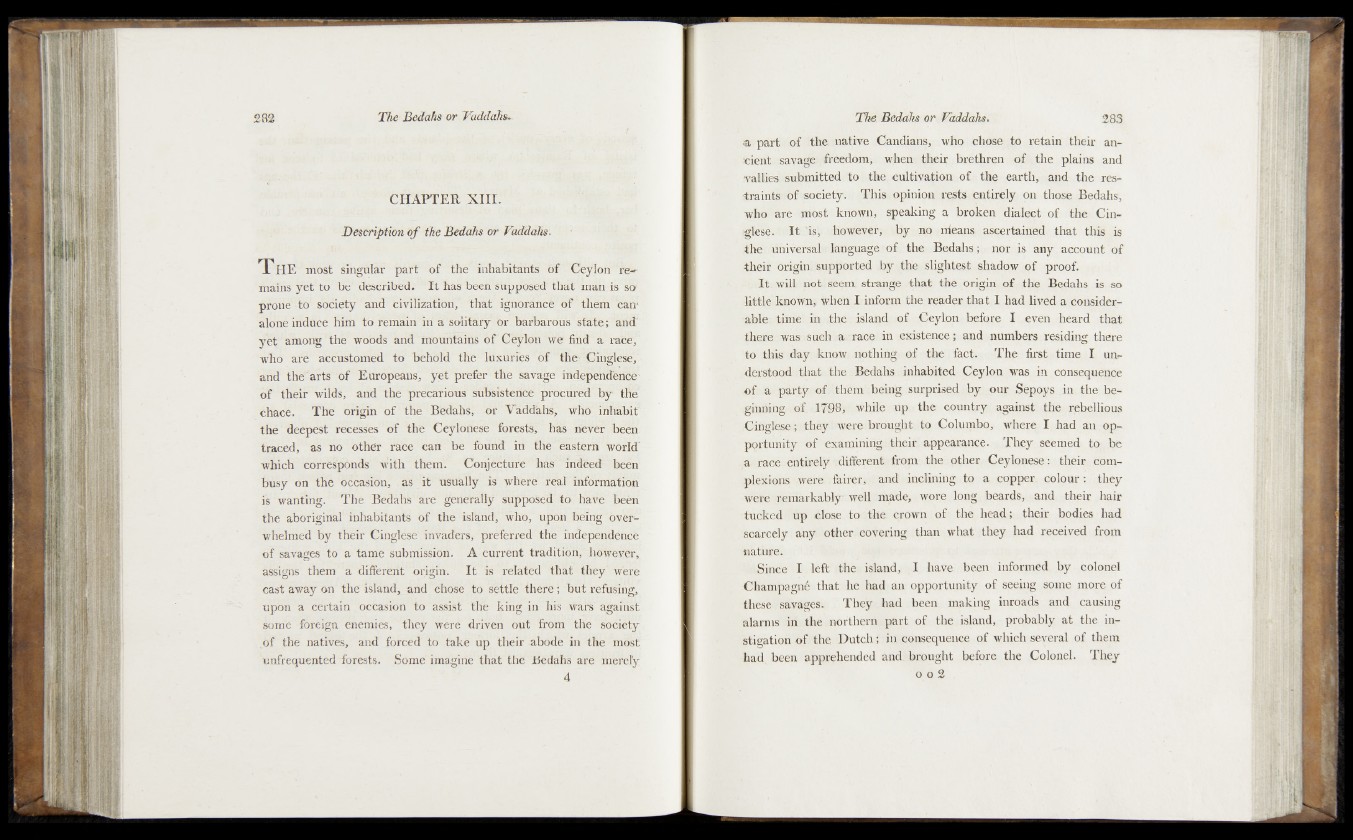
CHAPTER X III.
Description o f the Bedahs or Vaddahs .
T h e most singular part o f 'thë?%Tïabitarits 6f ^ë^ion"j4fe^
fiisHas y ë f tcfhie; described.' I t has beëb^shppösed' that -man isW .
pföhe'Il^j^séiéór 'and ci^nizafibn, that" d^iorancF of^ them can*
albne induce him tb remain in' a s a h ta ry b r barbarous simhf and
y è t ainoEtg the Woods and‘Mountains ÓFCeylon we find a race,
who are accustomed to' behold~ the - *1 uxuribs T of' me'" CingleSef
and t®?arts^of Europeans, yet prefer'the ‘ 'savage*
óf thèir wilds, and thé prédarious subsisten^ procured' by tfiia
Óhkcé. The origin óf thé Bedahs, or VaddkhS, who inhabit
th e ' deepestrecesses of thë“'Ceylonese rdresfS? has nèfyethéen;
traced, as no other race can be föimd m the eastern'world
Which cbrrëlpónds with them. Conjecture'“lias' indeed »been
Busy on thê occasion, as it usually, is yhëfe real information
Is wanting. The Bedahs "are generally supposed t o “ have1" been
the aboriginal inhabitants of the island, Who, upon, bemg^bver-
whelmed by their Cinglése invaders, préfêrred the inaëpéndéncè
of savages, to a tame submission. A Current traditipn^hbwe^er,
assigns them a different origin. I t is related that tnèyvWëre
cast away On thé island^and ehose to settle there; but refusing,
upon a Certain occasion to assist thé king in his Wars' a g tó ft
somë dbréign enemies," they weré driven out from the society
,df the natitës, and forced to fake up their abode in the mbSt
unfrequented forests. Some imagine that the Bedahs are merely
4
a part; ;of 'the native ;f2andiq®f,' whochbsejfco retain their an-
fcient .sava^elftfreedom, when theirj brethren of'.the plains and
valtieshsiirbmitted to thet oultivation of the earth, and the res*
#aintaf:b £ ^&tiy : This., opinion rests entirely, op those Bedahs,
who^life most known, speaking a broken dialect o f the Cin-
^glese. I t 'islr .howfeverj 'iby no tideans ascertained that .this is
the dhiversalwlanguage t of the Bedahs; nor is any account of
-their origin’, supported ^y^tfe,,slightest. shadow of proof.
It. Willimotb^eemi strange th a t, tfie. origin, of the Bedahs is so
dittieiknown, when I inform the reader that I had liybda Considerable
time' in th e island (<a£ ^eylon before I even heard that
theres^w-asns ueh; aiiraeefjin .exss’teace; and numbers; residing there
It# this day; know, nothing, of the fact. The first time I un*
derstood .that-the iffiedahs.vtinhabited Ceylon was in consequence
of a party ofHth&utbein'g surprisedpby our Sepoys in ,the be-
.,giuahngW-®f <.17®%;. while up the country against the rebellious
.tCifegldS.«.;.'they bwere, brought, to , Columbp, where .1 had an op*
p p rtu ^ t^ f^ f“ examiningsi.their. appearance. They seemed- to^Jbe
a race entirely ’idifferenfc from tlie ^pther, CeylQnese : their complexions
tWeifC'-' fairer, and inclining-to a copper, colour: they
wete'veniarkably well made, were long beards, and their hair
tucked up Close to the. crown of the head; their bodies had
scarcely:any other covering than what they had received from
nature.
; aSince I left t h e , island, I have been informed, by colonel
Champagnb that he had an opportunity of seeing some more of
these savages. They had been, making inroads and causing
alarms in the northern, . part of the. island, probably at the instigation
of the Dutch; in consequence of which seyeral of them
had, been apprehended and. brought before the Colonel. They
o o 2